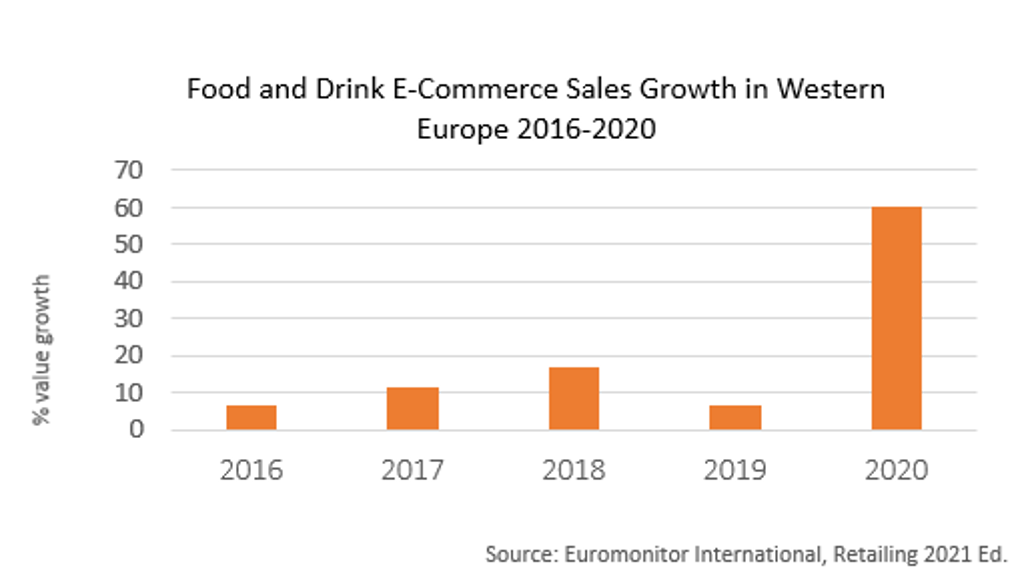Nostalgia in Western Europe had been growing in popularity over the past few years, but since the world was beset by Coronavirus (COVID-19), consumers have increasingly turned to the past to give themselves a sense of stability and manage their anxieties.
Hence nostalgic food and drink products have seen an uptick in demand since the first lockdowns in 2020, particularly through e-commerce, as epitomised by the success of Amazon retro sweets, which was fuelled by isolated consumers seeking to reminisce about happier times of their childhood and form a sense of connectedness with friends and family.

Since 2020, manifestations of nostalgia have also accelerated in other sensory products and services that can be consumed at home, such as music and video streaming, or online gaming, with consumers who have been somewhat deprived from physical interaction and travel increasingly turning to social media and online gaming for escapism and entertainment.
These digital platforms allow brands to connect with consumers through shared values via video, music, imagery, and games, as illustrated by well-established fashion brands such as adidas hopping on the Animal Crossing bandwagon.
As European consumers now adjust to spending more time outside of the home, brands and companies can continue to harness consumers’ desire for happy and familiar past experiences but to ensure success, they should bear in mind three important considerations:
-
Generational gaps create different nostalgic demands
Millennials and Gen Z seek out different nostalgic experiences. Millennials seek the comfort of childhood and tend to embrace the 1990s. Two brands surfing on this include the Body Shop, which has relaunched its iconic White Musk fragrance for 80s and 90s kids; and toymaker Playmobil which has introduced a Back to the Future range, as well as Volkswagen Camper Van edition in 2020.
On the other hand, when Gen Zs retreat to childhood memories they turn to the 2000s, as seen in TikTok posts elevating the Prada Nylon bag to ultimate must-have “it-bag”. Moreover, Gen Z also seek to escape to happier times they have not known and feel they missed out on, as evidenced in the high number of throwback TikTok posts about aesthetics from different periods such as the 1970s.
-
Technology transforms nostalgia experience
As COVID-19 accelerated digital reliance across Western Europe, brands have merged the old with the new, offering consumers the opportunity to use new technology to connect with the past. Technology is being used to fuel a nostalgic escape to go into a different world.
These digital platforms and the subcultures that exist on social media allow brands to explore their heritage and help consumers belong to a community and re-live the emotions of times past, through music via platforms such as Spotify, or even Deepfake technology, as seen in the latest Breitling marketing campaign.

As consumers adjust to a new normal, the challenge for brands will be to recreate this compelling sense of community and escapism through in real life (IRL) immersive experiences that seamlessly complement digital-first nostalgia.
-
Nostalgia offers brands a chance to revisit their core values
Consumers are also increasingly conscious about social issues and do not want to abandon progress and glorify problematic aspects of the past. Instead, these consumers want brands to harness nostalgia to return to wholesome core values and re-integrate qualitative ways of living into contemporary life, in a way that simultaneously works to build a better future.
An example of a brand that has embraced its heritage while adapting to the values of today is Barbie. The brand has taken initiatives to celebrate diversity and female role models, introducing dolls from different races and ethnicities with features such as no hair or prosthetic legs.
This rebrand encourages the creativity and playfulness of old while promoting today’s values of inclusivity and female empowerment, a winning strategy to appeal to parents looking to buy toys from their childhood for themselves or their children.

Since the pandemic, many consumers are deciding that they want to consume more responsibly and ethically. For this reason, brands can turn to what can be called “progressive nostalgia” which celebrates authenticity and returning to their core values while adapting to modern day ideas about social progress on issues such as gender equality, inclusivity and diversity, re-imagining consumption and a different relationship with the planet.
Euromonitor International’s Nostalgia in Western Europe briefing examines the relevance of nostalgia for today's consumer mindset, the possibilities brands can explore and the pitfalls that they should avoid in incorporating nostalgia into their strategies. For more insights, click here.
